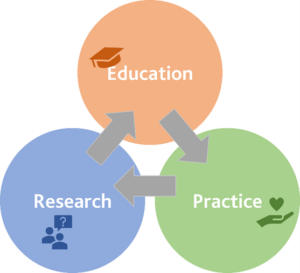Taking dementia education to the next level
Dr Chris Russell, Teresa Atkinson, Mary Bruce, Nicola Jacobson-Wright – School of Allied Health and Community
Ensuring that those who support people living with dementia are skilled and knowledgeable is essential to providing quality care (Surr, 2020).
We are a small teaching team, formed in 2019 to develop a new Postgraduate Certificate in Person-Centred Dementia Studies delivered fully online. The content and andragogy are rooted in our underpinning values embedding our passion for person-centred dementia care into our teaching and beyond into professional practice.
The course was developed in response to the need to reach professionals with differing constraints on opportunities to engage with education. We decided to develop a fully online programme, delivered via synchronous and asynchronous content, that would take practitioners on a learning journey to challenge their thinking, extend their knowledge and empower them to change practice (V2, K4). We wanted to create an online dementia qualification that was flexible, achievable, engaging and innovative in the way it was delivered (V1, V2, A5).
To do this, we built on best practice and learnt about the technology and practicalities of online learning. We liaised with colleagues locally and internationally who held experience in the field, gathered advice from the University’s Head of Digital Learning and Teaching, and subsequently used a research-informed teaching approach to embed research conducted by our team into module content.
We made good use of the culture and practices inherent to the Association for Dementia Studies, research and education centre at the University of Worcester within which we are based. Figure 1 captures our approach, based upon this culture and practice.

We found that feedback from students reflected their appreciation for this approach, for example:
‘Being with inspiring people and being taught by experts with passion for their chosen subject’.
Four themes demonstrate the impact of our teaching:
Creating a learning community. Good learning does not happen in isolation. Encouraging peer support is congruent with our appreciative inquiry approach, with valuable opportunities created through discussion boards, group work and collaborate sessions. The programme is fully online, but care is taken to foster a sense of belonging which is appreciated by students, as these examples of feedback demonstrate:
‘There are opportunities to meet with others in online tutorials, and to contribute to online discussions where we can learn from others’.
‘I found this module to be very user friendly and the input from tutors has been amazing, always felt supported and encouraged. It created a friendly, welcoming atmosphere even through virtual collaboration sessions’.
Putting learning into practice. We encourage students to make a difference to dementia care. Applying for the Hennell Award is one way of demonstrating the impact of their learning. June Hennell was a carer for her husband (who lived with dementia before he sadly passed away) and worked with us to develop the modules. June dedicated the prize recognition of putting learning into practice to benefit those affected by dementia. A student completing the Expert Practice in Dementia Care module worked in partnership with a University and Hospital in Zimbabwe, using the FITS model to apply her learning. She trained African healthcare professionals who now cascade this training further to enhance the lives of people living with dementia. In 2019 this excellent work was recognised through the student winning the Hennell Award!

Linking with employers. Having direct input from workforce leaders is important to ensuring the modules deliver learning that will make a difference in dementia care. We created the Admiral Nurse Competency Framework module with Dementia UK (a specialist dementia nurse charity) to comply with their mandatory qualification requirements. Each year several students progress to the full post-graduate programme. Learning from other modules, such as working with family carers, environmental change and end-of-life care enhances their practice. Dementia UK reflected this stating:
‘In terms of practice and changing practice, what we are hearing back from the nurses is that following the course they have got much more of an awareness of the competency framework, of what it means and how it can be purposeful for them when they are out in practice. That is essentially what we, as an organisation wanted, so the course is doing what we wanted it to do’.
Beyond the curriculum. Changing practice and behaviour is important to sustain learning beyond the curriculum. One of our modules focusses on empowering people living with dementia and understanding their agency within the world. A student studying this module heard this message clearly from a woman living with dementia who had produced video content, in which she shared her passion for walking and her wish to continue this. The student was facilitated to contact her and, together with a researcher from our department, they completed the 100km Jurassic Coast Challenge. Bringing learning to life through personal experience supports students not only to lead care to meet the needs of individuals, but also to support people living with dementia to maintain their place in the world as people with agency and aspiration.

Our aim in developing the Postgraduate Certificate in Person Centred Dementia Studies was to deliver tools for change which takes students on a learning journey that enhances their confidence and their practice. Reflecting upon the success of the course so far, this has been achieved through content which is co-produced with students, workforce leaders and people who have experienced the dementia journey. Making content congruent to learners who experience real life situations makes the material relevant, but the way this is delivered adds an extra dimension to the experience. Excellence in teaching is delivered through passion, partnership and respect for the student journey, as this reflection on learning offered by a student demonstrates:
“What I take away from this course is so applicable in many fields – mostly it is the power of empathy, the need to centralize our actions around the voices/needs/wants of those with lived experience, and the incredible power we all can have as leaders at any level, and the importance of deeply understanding issues from a range of perspectives in order to make valuable change”.
We felt privileged this year to be a winner of the University of Worcester Teaching Team Award.
References:
Surr, C.A., Parveen, S., Smith, J. S., Drury, M., Sass, C., Burden, S. & Oyebode, J. (2020) ‘The barriers and facilitators to implementing dementia education and training in health and social care services: a mixed-methods study’, BMC Health Services Research, 20, article no: 512. doi.org/10.1186/s12913-020-05382-4.
